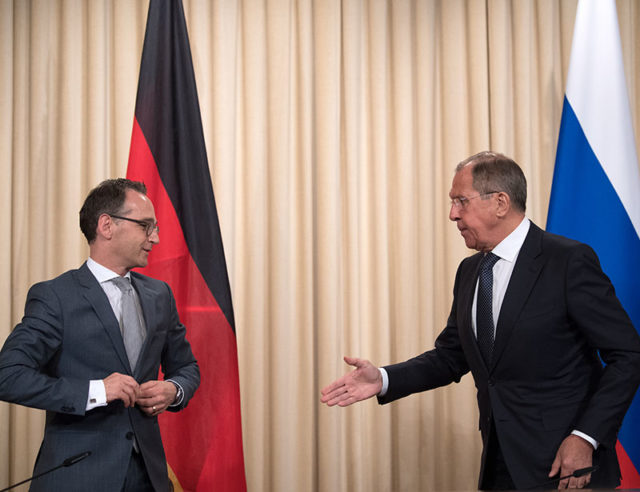
Moscow and Kyiv Respond to German Proposal on the Kerch Strait and Azov Sea (Part Two)
Publication: Eurasia Daily Monitor Volume: 16 Issue: 8
By:

*To read Part One, please click here.
Russia’s Foreign Minister Sergei Lavrov seems actually keen for German and French observers to arrive as soon as possible at the Kerch Strait—albeit on Russian-defined ground rules. Following the November 25, 2018, assault on Ukrainian naval ships, short-lived blockade of the Strait and a cooling-off period (see EDM, November 26, 28, 2018), Russia has put on its best behavior in recent weeks by “allowing” safe passage of commercial ships. Moscow wants its “de-escalation” gesture to be confirmed through international procedures that would in no way affect Russia’s seizure of that territory, or (even better) would tacitly comply with it de facto (acceptance of Kerch Port Authority pilotage would be one of the forms of such compliance) (see Part One, EDM, January 22, 2019).
Concluding the talks with his German counterpart Heiko Maas in Moscow (see EDM, January 21, 22, 2019), Lavrov explained the background to this initiative at their joint news conference. German Chancellor Angela Merkel had asked Russian President Vladimir Putin to allow German experts to “arrive in the area of the Kerch Strait, observe how shipping moves through it, and see that the necessary safety measures, including pilotage, are being complied with,” explained Lavrov. The German chancellor followed up with a request that French experts should join the German ones in that observation mission. Putin promptly approved both requests, Lavrov said, “but no experts arrived during the intervening month. For our part, we can proceed even today, tomorrow, any day” (Interfax, RIA Novosti, January 18, 2019).
Lavrov, however, objected to Maas’s suggestion that observation procedures first agreed between Russia and Germany should afterward be cleared with Ukraine. This, Lavrov retorted, would end up in a deadlock such as already experienced in the “Normandy” forum (Russia, Ukraine, Germany, France).
Maas seemed keen to proceed with a short-term fix and, eventually, to showcase a long-term “solution”: “Germany and France could address themselves to matters of free passage of ships through the Kerch Strait. Free passage is now assured, as all interested parties confirm now. Germany and France, as ‘Normandy’ group members, could in one way or another certify that free passage is assured.” Moreover, Germany and France could finance a possible monitoring mission, “so that the international community sees that we have found a long-term solution for passage through the Kerch Strait” (Interfax, RIA Novosti, January 18, 2019).
Kyiv’s lawful objections and reservations, however (see EDM, January 22, 2019), seem to have inspired a time-out for further reflection in Berlin, and an expectation-management step by Moscow. Russia’s state secretary and deputy minister of foreign affairs, Grigory Karasin, has clarified for the press that Moscow has not (as yet ?) agreed with Germany and France about a long-term presence of their observers in the Kerch Strait. “Our president, in his recent telephone conversation with the German chancellor, has [only] agreed that there would be a one-time visit by German and French observers at the level of experts, who would then report their findings back to their governments. This is all that has been agreed” (RIA Novosti, January 22, 2019).
An incremental approach such as implied in Karasin’s statement would make sense for Moscow. It could turn that first reporting exercise into a test of how an eventual full-fledged monitoring mission might cooperate with Russian occupation authorities; whether the mission would de facto accept the “new realities on the ground” (Russian “sovereignty,” “border,” contacts with local Crimean “authorities”) as a price for proceeding with the mission; as well as to what extent would it be prepared (as part of the aforementioned price) to tolerate interference with the mission’s equipment or engage in self-censorship. Russia’s interactions with the Organization for Security and Cooperation in Europe (OSCE) over the years in post-Soviet conflict theaters can be a reassuring experience for Moscow in all of those respects.
Following Maas’ back-to-back visits to Moscow and Kyiv, the possible next steps are: First, some re-drafting of the proposal in Berlin, taking into consideration Ukrainian Foreign Affairs Minister Pavlo Klimkin’s observations (see EDM, January 22, 2019). Second (as Maas agreed at Kyiv’s request), bilateral German-Ukrainian expert-level consultations on legal and technical aspects of the proposed monitoring mission. And third (which Kyiv proposes but Moscow opposes), adding the proposed mission to the agenda of the quadripartite “Normandy” forum, whether on the technical or the political level. There, Ukraine would officially play its role in shaping the proposed monitoring mission’s mandate.
This whole initiative is bypassing the OSCE, and not only on account of German-Russian bilateralism. The OSCE is experiencing serious budgetary problems, which it kept under silence for some time, but were brought into the open recently (IPN, Agerpres citing DPA, January 10, 2019). The organization’s current chairperson-in-office, the widely-respected Slovak minister Miroslav Lajcak, told the press on his first visit in this capacity to Kyiv that the OSCE is not being asked to extend its Special Monitoring Mission from Donbas into the Sea of Azov (UNIAN, September 15, 2018).



